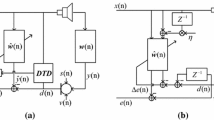Abstract
Compared with a single-channel echo cancellation, the spatial information of dual-channel echo cancellation enables the listener to obtain more potential information. This paper presents a dual-channel nonlinear acoustic echo cancellation method in α-stable distributed noise environment using a collaborative adaptive filter. Based on the minimum deviation criterion, the normalized minimum lp norm of error is used to update the weights of linear and nonlinear filters extended by nonlinear functions. The output signals are cooperatively combined to eliminate the linear and nonlinear echo. The weight error vector norm and echo return loss enhancement are both used to evaluate the effect of echo cancellation. Simulation results show that the presented echo cancellation method has a better performance than other dual-channel echo cancellation methods in the presence of α-stable distributed noise and nonlinear echo environment.






Similar content being viewed by others
Data Availability
Some or all data, models, or code generated or used during the study are available from the corresponding author by request (List items).
References
M. Ali, Stereophonic acoustic echo cancellation system using time-varying all-pass filtering for signal decorrelation, in IEEE International Conference on Acoustics, Speech and Signal Processing (ICASSP) (Seattle, WA, USA, 1998), pp. 3689–3692
F. Amand, J. Benesty, A. Gilloire, A fast two channel projection algorithm for stereophonic acoustic echo cancellation, in IEEE International Conference on Acoustics, Speech, and Signal Processing (ICASSP) (Atlanta, GA, USA, 1996), pp. 949–952
M.G. Bellanger, Adaptive Digital Filters and Signal Analysis, 3rd edn. (Marcel Dekker, New York, 1987)
J. Benesty, F. Amand, A. Gilloire, Y. Grenier, Adaptive filtering algorithms for stereophonic acoustic echo cancellation, in IEEE International Conference on Acoustics, Speech, and Signal Processing (ICASSP) (Detroit, MI, USA, 1995), pp. 3099–3102
J. Benesty, D.R. Morgan, M.M. Sondhi, A better understanding and an improved solution to the specific problems of stereophonic acoustic echo cancellation. IEEE Trans. Speech Audio Process. 6(2), 156–165 (1998)
A. Barik, R. Nath, A. Kar, M. Chakraborty, Adaptive multiple sub-filters based stereophonic acoustic echo cancellation. Adv. Mater. Res. 1566, 3022–3027 (2012)
D.-X. Chang, D.-Z. Feng, An recursive total least mean p-norm algorithm applied in alpha-stable noise environments. Acta Electron. Sinica 31(3), 426–428 (2003). (in Chinese)
H. Chen, Y. Zhou, X.-D. Li, New normalized least mean M-estimate algorithm for stereophonic acoustic echo cancellation, in IEEE 2nd International Conference on Advanced Computer Control (ICACC) (Shenyang, China, 2010), pp. 243–247
D. Comminiello, M. Scarpiniti, L.A. Azpicueta-Ruiz, J. Arenas-Garcia, A. Uncini, Functional link adaptive filters for nonlinear acoustic echo cancellation. IEEE Trans. Audio Speech Lang. Process. 21(7), 1502–1512 (2013)
G. Gui, L. Xu, W. Ma, B. Chen, Robust adaptive sparse channel estimation in the presence of impulsive noises, in IEEE International Conference on Digital Signal Processing(ICDSP) (Singapore, 2015), pp. 628–632
S. Haykin, Adaptive Filter Theory, 4th edn. (Prentice-Hall, Englewood Cliffs, 2002)
Y. Joncour, A. Sugiyama. A stereo echo canceler with pre-processing for correct echo-path identification, in IEEE International Conference on Acoustics, Speech and Signal Processing (ICASSP) (Seattle, WA, USA, 1998), pp. 3677–3680.
Y. Liu, Z.-H. Fu, L. Tang, A dual-channel acoustic echo canceler on windows platform. Comput. Mod. 4, 199–202 (2014). (in Chinese)
S. Liu, Y. Ma, Y. Huang, Sea clutter cancellation for passive radar sensor exploiting multi-channel adaptive filters. IEEE Sens. J. 19(3), 982–995 (2019)
W.-X. Lu, L.-J. Zhang, Collaborative block-delay Volterra filters for nonlinear acoustic echo cancellation. Appl. Acoust. 156, 83–91 (2019)
M. Messini, M. Djendi, A new adaptive filtering algorithm for stereophonic acoustic echo cancellation. Appl. Acoust. 146, 345–354 (2019)
G.L. Sicuranza, A. Carini, A generalized FLANN filter for nonlinear active noise control. IEEE Trans. Audio Speech Lang. Process. 19(8), 2412–2417 (2011)
T. Shan, Y. Ma, R. Tao, S. Liu, Multi-channel NLMS-based sea clutter cancellation in passive bistatic radar. IEICE Electron. Express 11(20), 1–12 (2014)
L.-M. Shi, Y. Lin, Convex combination of adaptive filters under the maximum correntropy criterion in impulsive interference. IEEE Signal Process Lett. 21(11), 1385–1388 (2014)
F.-Y. Wu, F. Tong, Nonuniform norm constraint LMS algorithm for sparse system identification. IEEE Commun. Lett. 17(2), 385–388 (2013)
Z. Wu, S. Peng, B. Chen, H. Zhao, Proportionate minimum error entropy algorithm for sparse system identification. Entropy 17(12), 5995–6006 (2015)
L.-D. Yang, J.-X. Liu, R.-Q. Yan, X.-F. Chen, Spline adaptive filter with arctangent-momentum strategy for nonlinear system identification. Signal Process. 164, 99–109 (2019)
J.-F. Zhang, T.-S. Qiu, H. Tang, Robustness analysis of DLMP algorithm under α stable noise environments. Acta Electron. Sinica. 35(3), 515–519 (2007). (in Chinese)
Z.-J. Zhao, X.-H. Zheng, J.-N. Shang, Variable tap-length LMP algorithm in α-stable distribution noise. Audio Eng.. 34(11), 76–78 (2010). (in Chinese)
S. Zhang, J. Zhang, H. Han, Robust shrinkage normalized sign algorithm in an impulsive noise environment. IEEE Trans. Circuits II 64(1), 91–95 (2017)
Y.-B. Zhao, T. Yan, C.-B. Li, L. Yang, Research on nonlinear echo cancellation in the α-stable noise environment. Acta Electron. Sin. 48(1), 59–65 (2020). (in Chinese)
Y.-B. Zhao, T. Yan, W.-Y. Chen, H.-Z. Lu, A collaborative spline adaptive filter for nonlinear echo cancellation. Circuits Syst. Signal Process. 40, 1699–1719 (2021)
Acknowledgements
This work was in part supported by a research grant provided by a Project Funded III by the Priority Academic Program Development of Jiangsu Higher Education Institutions, National Natural Science Foundation of China (61871230), Jiangsu Natural Science Foundation (BK20181410).
Author information
Authors and Affiliations
Corresponding author
Additional information
Publisher's Note
Springer Nature remains neutral with regard to jurisdictional claims in published maps and institutional affiliations.
Rights and permissions
About this article
Cite this article
Zhao, YB., Li, SH., Ge, YX. et al. Research on Dual-Channel Nonlinear Acoustic Echo Cancellation in α-Stable Distributed Noise Environment. Circuits Syst Signal Process 41, 5614–5631 (2022). https://doi.org/10.1007/s00034-022-02041-3
Received:
Revised:
Accepted:
Published:
Issue Date:
DOI: https://doi.org/10.1007/s00034-022-02041-3




